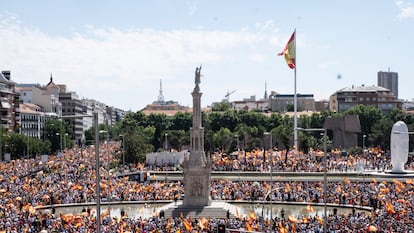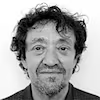Thousands join right-wing parties in Madrid to protest pardons for Catalan separatists
The crowd of around 60,000 people was mostly there to support far-right Vox, with the conservative Popular Party and center-right Ciudadanos keeping a lower profile

Spain’s right-wing parties and around 60,000 protestors, according to calculations by EL PAÍS, took to Madrid’s central Colón square on Sunday to demonstrate against the central government’s plan to pardon the jailed leaders of the 2017 unilateral independence drive in Catalonia. The conservative Popular Party (PP), center-right Ciudadanos (Citizens) and far-right Vox were in attendance at the event, the second time that the three groups had come together at such a protest in the same location. But this time there was no photo of the parties’ leaders together, as had happened in February 2019, and there were fewer attendees than on that occasion – a protest also called to express rejection of the approach of Spanish Prime Minister Pedro Sánchez of the Socialist Party (PSOE) to the issue of Catalan independence.
While the leaders of Vox were cheered along by the crowd, PP chief Pablo Casado kept a somewhat lower profile, remaining at the entrance to the square where some members of the public were heard to jeer him. Notable by their absence were the influential regional PP chiefs, who had made their excuses earlier in the week not to attend the event. Also targeted by the crowd was Inés Arrimadas, the head of Ciudadanos.
The PP’s decision to stay in the background of the protest had an effect on the lower turnout. The central government’s delegation in Madrid, which is in the hands of the PSOE, estimated that around 25,000 people had come out to demonstrate – nearly half the 45,000 seen in 2019. The local police, however, under the leadership of the PP mayor of Madrid, put Sunday’s number at 126,000.
Under a burning midday sun, the Spanish national anthem was to be heard non-stop at the protest, and attendees carried the country’s flag and signs with slogans targeting Sánchez. Some called him a “murderer, egomaniac and globalist,” while another featured his photo next to a series of emoticons of excrement. More than a protest against the planned pardons of the nine men and women sent to jail for their role in the 2017 illegal referendum in Catalonia and subsequent unilateral declaration of independence, the crowds were demanding Sánchez’s resignation.
As the assembled demonstrators waited for the protest to start, some took selfies. “¡Viva España!” two men shouted as they smiled for their camera. The only party symbols on display were those of Vox – not a single logo from the PP or Ciudadanos was to be seen.
As well as Casado, the Madrid regional premier, Isabel Díaz Ayuso, and the city’s mayor, José Luis Martínez Almeida, were also in attendance. As well as the jeers aimed at him while he spoke to the press, Casado had to deal with another embarrassing moment. Díaz Ayuso made controversial statements calling on Spain’s King Felipe VI to not sign the pardons for the jailed separatists.
The measured tone of Casado at the event was in stark contrast to Ayuso’s comments, which directly implicated the monarch in the controversy around the pardons. “What is the king of Spain going to do, is he going to sign those pardons?” she asked at the event. “Are they going to make [the king] an accomplice in this?” Neither the mayor nor Casado knew that Ayuso was going to talk about the king in those terms, according to sources from the PP, Elsa García de Blas reports. Ayuso’s words caused cracks in the unity of the right, with Ciudadanos’s spokesperson in Congress, Edmundo Bal, calling on her to withdraw them.
The crowd had to wait impatiently around 50 minutes while a problem with the public address system was fixed. The fact that the front rows were packed out with Vox supporters was clear for all to see, when the party’s leaders – politicians such as Iván Espinosa de los Monteros, Javier Ortega Smith and Macarena Olona – appeared. They could barely make their way through the throng as supporters asked for hugs, kisses and selfies.
None of the Vox leaders, however, remained in the front rows after the organization of the event – the civic platform Unión 78, led by former UPyD party leader Rosa Díez had called on the politicians in attendance to stay in the background. The final photo of the party leaders, as was seen in 2019, had been ruled out ahead of time by the PP and Ciudadanos.
On the stage, politicians and intellectuals made speeches to the assembled crowd. Among them, the former Basque Country PP leaders María San Gil and Carlos Urquijo. The writer Andrés Trapiello argued that the protest was a “political and moral act” in defense of democratic values and the Constitution. The writer placed great emphasis in combatting the idea that the pardons could be a gesture of “mutual understanding,” as Sánchez has argued, because, he said, they will reward “those who want division.”
Trapiello cited Republican authors such as Antonio Machado and argued that the protest against the pardons was not just a question of “fachas,” a slang term that could roughly be translated as fascist. “There are people here from the right, but also from the center and the left,” he argued. The only trace of any symbol from the left, however, was a sign in the middle of the square held up by a dozen or so people and signed by a so-called “Center Right of Spain.” At the front of the crowd, where Trapiello was speaking, there were flags from the Spanish Legion, which was once commanded by former dictator Francisco Franco, t-shirts in support of the Civil Guard, and dozens of stickers with the slogan: “Stop invasion [sic]. Defend Spain!”
Rosa Díez spoke of the concept of “good Spaniards,” claiming that “we are the majority!” “We are not going to allow our nation to be handed over as a payment to major criminals so that Sánchez can sleep in La Moncloa for another two years,” she said, in reference to the seat of power. Díez announced that there would be more demonstrations, in Colón and in “other squares in Spain.”
English version by Simon Hunter.
Tu suscripción se está usando en otro dispositivo
¿Quieres añadir otro usuario a tu suscripción?
Si continúas leyendo en este dispositivo, no se podrá leer en el otro.
FlechaTu suscripción se está usando en otro dispositivo y solo puedes acceder a EL PAÍS desde un dispositivo a la vez.
Si quieres compartir tu cuenta, cambia tu suscripción a la modalidad Premium, así podrás añadir otro usuario. Cada uno accederá con su propia cuenta de email, lo que os permitirá personalizar vuestra experiencia en EL PAÍS.
¿Tienes una suscripción de empresa? Accede aquí para contratar más cuentas.
En el caso de no saber quién está usando tu cuenta, te recomendamos cambiar tu contraseña aquí.
Si decides continuar compartiendo tu cuenta, este mensaje se mostrará en tu dispositivo y en el de la otra persona que está usando tu cuenta de forma indefinida, afectando a tu experiencia de lectura. Puedes consultar aquí los términos y condiciones de la suscripción digital.










































